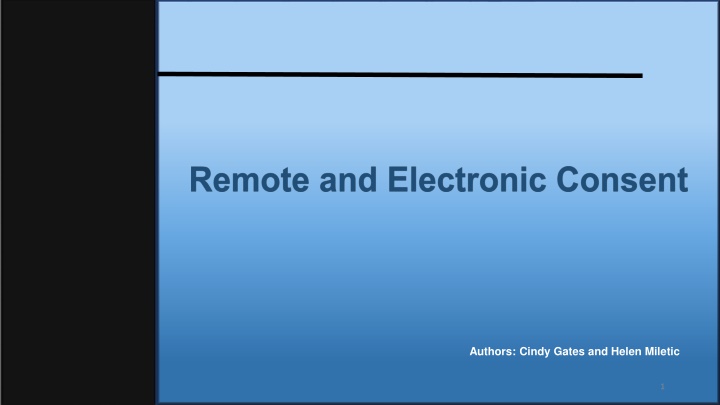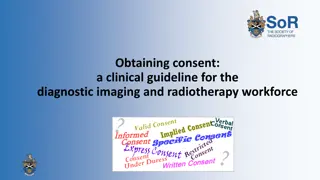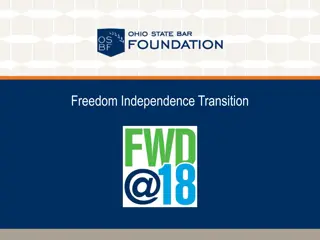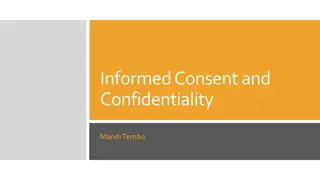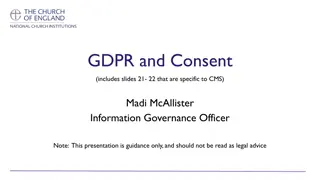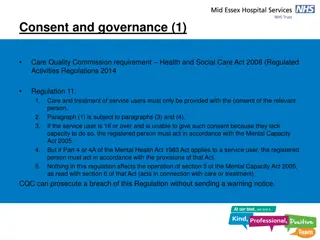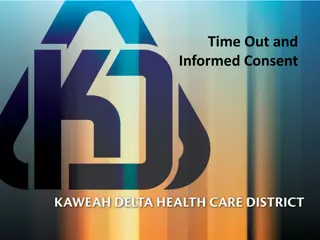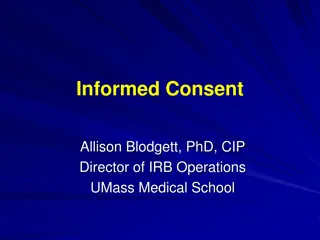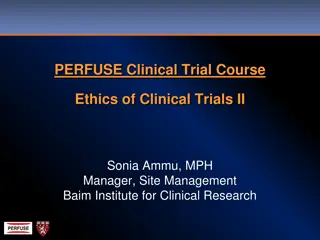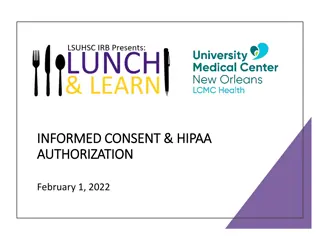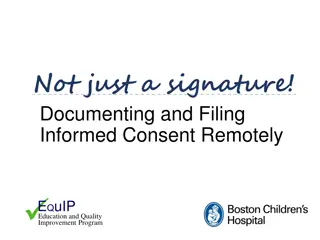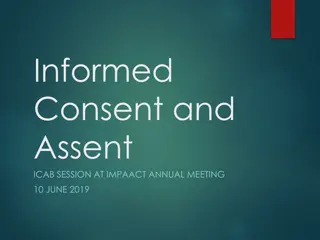Remote Informed Consent Process for Research Studies
This presentation covers the remote informed consent process for research studies, including defining remote consent, options for electronic informed consent, processes for minimal and greater than minimal risk studies, and guidelines for obtaining consent via electronic or wet signatures. It also discusses the use of REDCap and DocuSign for electronic consent, considerations for minimal risk studies, and tips for facilitating remote consent through HIPAA-compliant methods.
Download Presentation

Please find below an Image/Link to download the presentation.
The content on the website is provided AS IS for your information and personal use only. It may not be sold, licensed, or shared on other websites without obtaining consent from the author.If you encounter any issues during the download, it is possible that the publisher has removed the file from their server.
You are allowed to download the files provided on this website for personal or commercial use, subject to the condition that they are used lawfully. All files are the property of their respective owners.
The content on the website is provided AS IS for your information and personal use only. It may not be sold, licensed, or shared on other websites without obtaining consent from the author.
E N D
Presentation Transcript
Objectives Objectives Define remote consent Explain the options available for electronic informed consent Define remote consent process for Minimal Risk Studies Define remote consent process for Greater than Minimal Risk Studies Outline processes for obtaining informed consent via electronic signature vs. wet signature Define research documentation to be maintained 2
Remote Informed Consent Remote Informed Consent To obtain informed consent from participants when unable to come to the research site, due to: Pandemic/quarantine Patient in hospital isolation Hurricanes or other circumstances To obtain informed consent from Legally Authorized Representatives for trauma, stroke studies , etc. 3
Electronic Informed Consent Requirements Electronic Informed Consent Requirements Use REDCap for all non FDA- regulated studies Use DocuSign only for FDA- regulated studies 4
Minimal Risk Studies Minimal Risk Studies Minimal risk:probability and magnitude of harm or discomfort anticipated in the research are not greater than those ordinarily encountered in daily life or during the performance of routine physical or psychological examinations or tests Example: Questionnaire/survey studies Submit Modification to IRB: Add remote consent process to the protocol Consider requesting a waiver of documentation of consent (to waive signature on ICF) If the research will access medical information held by UHealth, consider requesting a waiver of signature on HIPAA Authorization Form B: Complete section of protocol for requesting Waivers of Authorization; or For previously approved studies, see waiver request form on HSRO website Wait for IRB approval 5
Facilitate Remote Consent Facilitate Remote Consent UM IT recommends HIPAA-compliant Zoom for Healthcare Contact TeleHealth team at telehealth@miami.edu If Zoom is not available: Arrange a conference call: Person obtaining consent Participant Additional people requested by participant (e.g. relative, friend) Impartial witness if the IRB did not waive documentation of consent/authorization and you will not be able to obtain a signed consent document (either electronically signed or scanned and emailed) 6
Prepare Consent Meeting Prepare Consent Meeting Inform participant if an impartial witness will join the consent meeting Impartial Witness: Person not involved in research study Clinical or research personnel (not working on the study) Participant s relative, friend, advocate Role of Impartial Witness: to attest that info in the ICF and any other info provided was accurately explained to, and apparently understood by, the subject/representative, and that consent was freely given 7
Remote Consent Process Remote Consent Process IRB- Approved Waiver of Documentation of Consent: Prior to meeting, send copy of ICF or Information Sheet via email or U.S. Mail to all attendees (if research includes sensitive topics or health information, use SECURE email) Identify everyone on the call or Zoom Review and explain consent document/Information Sheet Answer participant s questions Ask participant questions about study to confirm comprehension Ask participant if they consent to participate/continue participation If participant agrees: document that verbal consent was obtained Repeat the process for HIPAA Authorization, if applicable 8
Greater Than Minimal Risk Studies Greater Than Minimal Risk Studies Submit Modification to IRB: Add remote consent process and electronic consent to the protocol If you will not be able to obtain a signed consent document via an electronic signature or by having the participant/LAR scan and send the signed document, ensure the ICF has a witness signature line. Wait for IRB approval 9
Facilitate Remote Consent Facilitate Remote Consent UM IT recommends HIPAA-compliant Zoom for Healthcare Contact TeleHealth team at telehealth@miami.edu If participant cannot use ZOOM, use telephone Send a copy of the consent document to the participant/LAR via SECURE email Arrange a conference call or ZOOM meeting: Person obtaining consent Participant Impartial witness (if you will be unable to obtain an electronic signature or a copy of a signed consent document) Additional people requested by participant (e.g. relative, friend) 10
Prepare Consent Meeting Prepare Consent Meeting Inform participant if an impartial witness will join the consent meeting Impartial Witness: Person not involved in research study Clinical or research personnel (not working on the study) Participant s relative, friend, advocate Role of Impartial Witness: to attest that info in the ICF and any other info provided was accurately explained to, and apparently understood by, the subject/representative, and that consent was freely given 11
Remote Consent Process Remote Consent Process Identify everyone on the call or Zoom Review the ICF/HIPAA form Answer participant s questions Ask participant questions about study to confirm comprehension Ask participant if they consent to participate/continue participation If participant agrees, ask them to sign and date the ICF and HIPAA Authorization If using a 3-way call, ask participant to confirm they signed & dated the ICF and HIPAA Authorization 12
Option 1: E Option 1: E- -Signatures Signatures Electronic Signatures via REDCap or DocuSign Confirm identity of subject who will sign ICF is the same person who will participate in trial (e.g. request to see driver s license) Participant signs ICF documents in REDCap/DocuSign in designated areas Person obtaining consent signs and dates the ICF Signed ICFs and HIPAA authorization documents are automatically saved in system Participant can download or print the signed copy If participant requests, send a copy of the signed document via SECURE email or by US Mail. 13
Remote Consent Documentation Remote Consent Documentation Document remote consent process: Date and time List attendees by name Via Zoom or phone call E-signatures via REDCap or DocuSign State how identity of participant was confirmed (e.g. driver s license) Confirm that participant agreed to participate and signed the ICF Print ICFs containing all e-signatures, store in research file and upload into EPIC, if applicable 14
Option 2: Wet Signatures Option 2: Wet Signatures Participant signs & dates paper ICF Ask participant to scan or take a picture of each page of the ICF/authorization documents and email copies of the signed & dated documents to the study team or upload them to a UM Box location If participant is unable to sign due to disability or cannot take a picture due to lack of electronic resources, document the circumstances and mention COVID- 19 in the note, when applicable If you will not receive a copy of the signed and dated documents, a witness must sign & date a copy of the ICF The person obtaining consent should sign & date a copy of the ICF 15
Maintain in Research File Maintain in Research File Note: Will not have original witness signature if witness is with participant Original ICFs signed by investigator and witness Picture/scan of ICF and HIPAA Authorization signed by participant (and possibly witness) 16
Maintain in Research File Maintain in Research File Document remote consent process: Date and time List attendees by name Via Zoom or phone call Document that the document was read/explained to the participant and all questions were answered Participant answered questions and apparently understood Confirm that participant agreed to participate and signed the ICF State why original ICF signed by the participant was not retained o e.g. due to contamination of ICF by infectious material (COVID-19) If participant could not transmit a picture of the signed ICF back to the research team, document the circumstances 17
Sample Documentation Sample Documentation Informed consent was obtained on Date at Time. The participant could not come to the site for the consent process due to COVID-19 social distancing requirements. A copy of the consent document was provided to the prospective participant before the consent discussion. The consent process was performed by phone/ZOOM. The individuals attending the discussion were: (list the names of the individuals). The person obtaining consent explained the research to the participant and answered the participant s questions. The person obtaining consent asked the participant questions to ascertain whether s/he understood the study, and the participant was able to answer the questions. 18
Sample Documentation (continued) Sample Documentation (continued) The participant voluntarily agreed to participate. The subject/LAR signed and dated the consent document. The research team was not able to obtain the original signed consent document because consent was obtained remotely, and the document may transmit the COVID-19 infection. After signing the consent document, the participant took a picture and sent it to the research team/ OR The participant was unable to send a picture of the document. A witness observed the entire process. The person obtaining consent should then add similar documentation about the HIPAA authorization. 19
References References HSRO website COVID-19 tab HSRO SOP HRP-093: Electronic Signatures for Documentation of Consent FDA Guidance on Conduct of Clinical Trials of Medical Products during COVID- 19 Public Health Emergency March 2020 (updated Sept 21, 2020) FDA Guidance: Use of Electronic Informed Consent- Questions and Answers- December 2016 20
